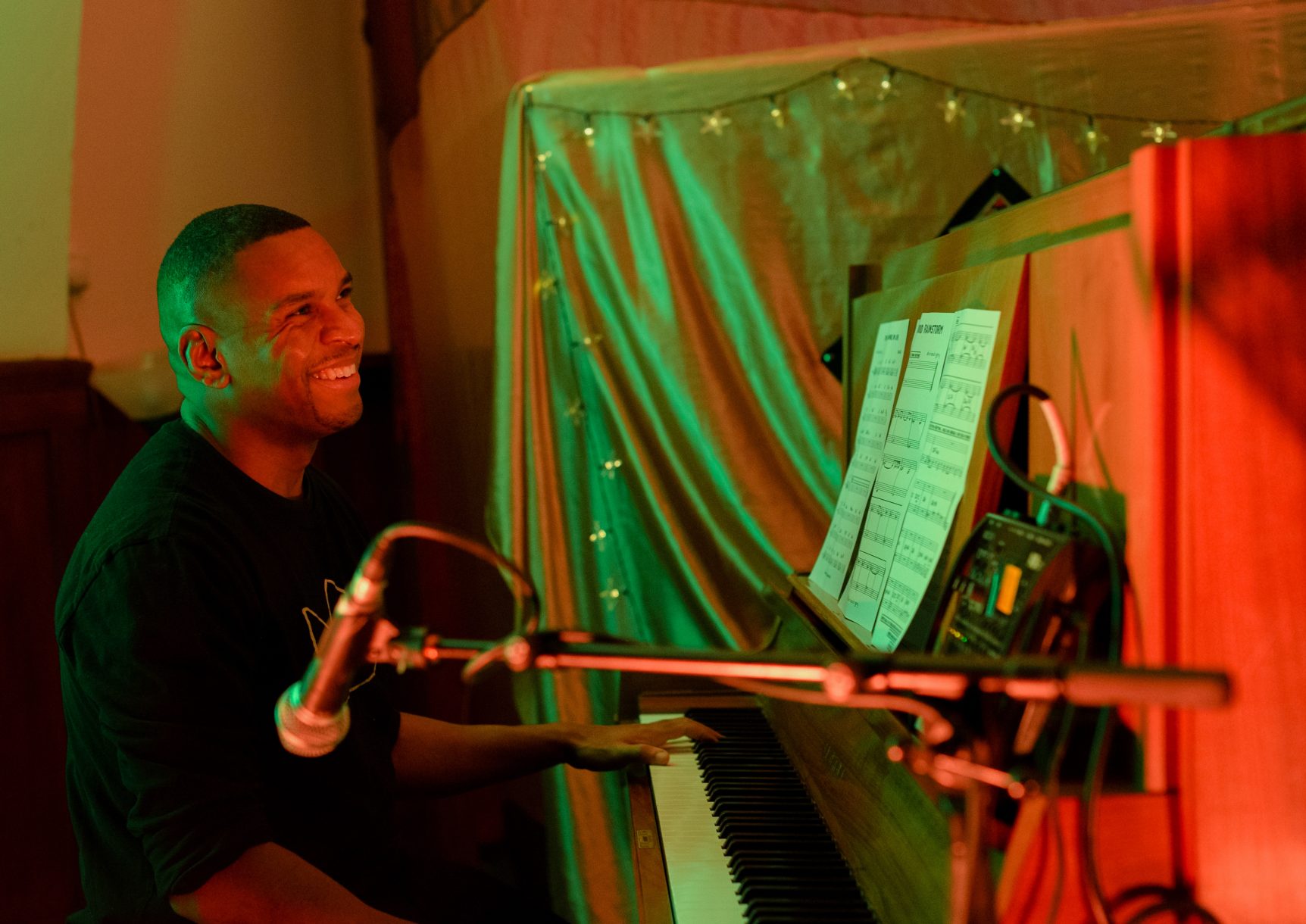David Austin Grey is a UK-based pianist, composer and educator. He has worked throughout the UK and performed internationally, with residencies and collaborations in Brazil, the USA and South Asia. His widely-acclaimed group Hansu-Tori has attracted media attention from the likes of BBC Radio 3, Jazzwise Magazine and Jamie Cullum.
In 2018 David was part of New Voices. This experience was a springboard that allowed him to explore an exciting new direction of his practice, and collaborate with new artists that he wouldn’t have otherwise been able to work with.
We sat down with David to find out more about his experience with us and how it impacted his practice and career.
Before New Voices, how would you describe your work, and where were you professionally?
Before New Voices I was composing for various different types of projects. I had a couple of bands of my own that I was developing and writing for. I had also been involved in a dance project with a small ensemble, a group of dancers and an illustrator. This avenue of interdisciplinary arts was what I was keen to develop further. I had also travelled to various culturally relevant places (most significantly Brazil) and was interested in seeing how other cultural influences or artistic influences might shape my music.
Tell us about your project on New Voices?
My project was called ‘In Search of Common Paradise’. For this, I wrote music for a large ensemble (larger than the ensembles I had been working with previously), and for visuals too. The work was an audio-visual project that merged pre-written composition performed by a live band, with improvisation and manipulation of the music.
That was set against a video created by a filmmaker. The visuals were based around the theme of migration, and represented group movement, or the idea of travelling from one place to another, but with the route being undefined. Whilst I usually work with my sextet band, Hansu-Tori, this project allowed me to include additional musicians who played alongside live electronics and pre-recorded voice and sound recordings. The support I received from Sound and Music in helping me to realise all of this was really invaluable.
What did New Voices teach you about composing that you perhaps hadn’t considered before?
In terms of the composing, I learnt a lot from my mentor on the programme. Thanks to New Voices, I was able to travel to New York to meet with the fantastic composer and trumpeter Dave Douglas. I contacted him to see if I’d be able to discuss my project with him and what I was hoping to achieve, as he’s a lot more experienced in writing for different mediums, in multiple genres, and working with large ensembles. We were then able to have some one-to-one sessions together which was extremely useful.
I learnt so much from him, but a stand-out piece of advice was that the less prescriptive you are as a composer, the more scope there is for opportunity and for wonderful things to happen. For instance, if you prescribe to each player in an ensemble exactly what they should do, and give them a lot of information, the end result can often be more limited. I try and take this idea on board as much as possible in my practice.
Did New Voices allow you to develop new practices, ideas, collaborations or concepts that you wouldn’t have been able to do otherwise?
New Voices enabled me to work with musicians that I had wanted to work with for a long time in this particular context, but whom I hadn’t been able to work with previously. It also gave me experience working with different people outside of my immediate field, and the confidence to approach practitioners who work in other mediums and environments.
New Voices gave me the space and opportunity to experiment and see what worked and what didn’t, to discover what the challenges were, and to realise how difficult or easy elements of the process were going to be. This was a really valuable lesson, as it gave me an overview of the different demands of working on large-scale projects, where there are lots of moving parts and people involved. As a result, I feel more confident that going forward I can replicate this with other large-scale projects.
How would you describe your experience of New Voices, in just a few sentences?
New Voices was very exciting and educational, and I learnt so much from it. It definitely helped me to evolve as a composer, and to think about my work and practices.
A highlight of the programme was how supportive it was; I felt supported to be able to try something which I probably wouldn’t have had the opportunity to try otherwise.
You can find out more about David’s work here, and watch ‘A Dark Place to Nest’ taken from ‘In Search of Common Paradise’ here.
At Sound and Music, we strive to support composers from all walks of life to realise their potential, and enable them to create high-quality, ambitious work. As a charity, we need your help to support more fantastic composers like David up and down the country.
If you feel passionate about the new music of tomorrow, then please consider supporting us today. Head to our Support page to find out more.


